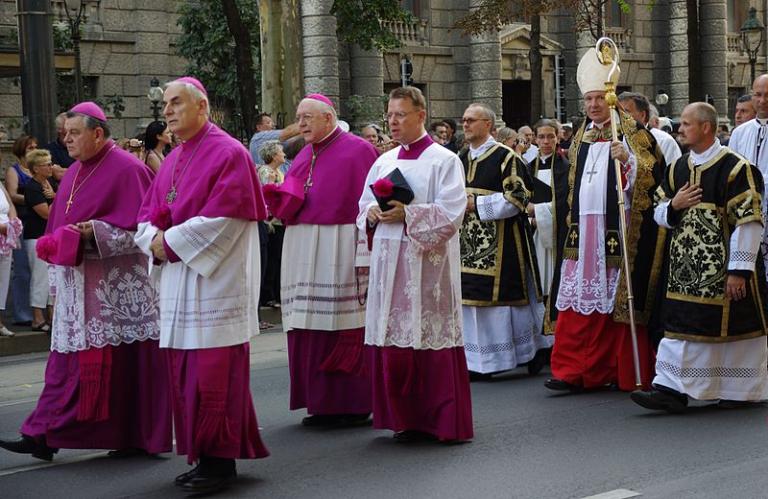
It’s the fifteenth Ordinary General Synod of Bishops since these began post-Vatican II, and it has as its topic Young People, Faith, and Vocational Discernment, but, readers, I’ll be honest, I’ve tried to read the Instrumentum Laboris, the document which serves as an agenda/guiding document for the synod and I just didn’t really get it. Today a friend shared a critique of the synod which reinforced my confusion and concerns.
This synod is the successor synod to the Synod of the Family three years ago, which had as its result Amoris Laetitia, which was full of generic passages on the importance of family life, with nothing particularly remarkable except the infamous footnotes that may or may not have said that it’s OK to divorce and remarry and take communion, as long as you’re not a deadbeat dad.
What will the outcome of this synod be?
Part of what troubles me is that I can’t figure out if the attendees are supposed to be experts or if there’s supposed to be some process whereby they learn from experts. Cardinal Marx from Munich is going to be there. Is he going to claim he has it all figured out, or is he attending precisely so as to be able to ask the African bishops what their secret is?
But the Instrumentum Laboris (or the IL, as it is apparently called) seems fairly secular in many of its concerns. Will this, in the end, be a matter of proclaiming that, since young people care about and are affected by income inequality, the environment, and similar issues, our concern for them make it all the more important to be active in these areas?
And at the same time, there seems to be a great deal of emphasis on the new trendy buzzword of accompaniment. Rather than handing down the faith, one is to accompany young people as they seek out answers and try to discern what the spirit is telling them. “Vocational discernment” appears not to have anything to do with vocations of religious life, but just of young people more generically trying to figure out what they’re meant to do in life.
There are also a few sentences about sexual morality. There’s nothing that explicitly says, “maybe we should rethink two millennia of teaching” but there are comments like, “what should we tell young people who are in same-sex relationships and want to have a connection to the church?” Will this be a basis for a document which casts Catholic sexual teaching as an “ideal” that’s kinda-sorta optional, just recommended like saying a daily rosary?
But the overall document just seemed so all-over-the-place in its themes, addressing anything that has to do with young people. And quite honestly, a young adult in the United States has so little in common with a young adult in Africa, or with an African paying a smuggler to get him to Europe, that having a synod attempting to address this as a topic seems like it will simply be unable to pull together a meaningful common set of recommendations. What’s more, I don’t get a particularly firm sense, other than rambling flowey language, that the authors of the synod document have any particular sense of crisis. Does Marx understand that a random visitor to a random parish on a random Sunday will see pretty much nothing but grey hair? Does Cupich have any sense of worry that the US will follow Europe in this regard? Or are the Pope’s handpicked delegates convinced that the way to bring young people back is to get rid of whatever teachings they may dislike, because the Episcopalians are doing so well?
And the recent news that
In a new apostolic constitution, Pope Francis has reformed the Synod of Bishops, creating a mechanism for the assembly’s final document to be included in official Church teaching.
Episcopalis Communio, promulgated by the pope on Sept. 15, establishes that the final document of a synod assembly, drafted and approved by a special commission, can be considered part of the ordinary magisterium – that is, the official teaching of the Church – if it receives a particular level of papal approval.
left me wondering what sort of “teaching” might be a part of such a document that would be meaningfully “new” rather than a restatement of existing teaching with applications for the situation we find ourselves in, in 2018. The idea that the Pope seems to envision that there might be a new teaching does concern me, and all the more so considering that Marx seems to have has already been busy promoting communion by non-Catholic spouses and by remarried individuals, and even suggested that same-sex union blessings might be fine if deemed “pastoral care.” In other words, if Marx can steer the outcome of the synod, almost anything might be signed off on if it can be labelled “pastoral care.”
Now, maybe I’m reading too much into this. The bishops get together every three years. Put nicely, they build relationships and share their challenges with each other; put cynically, they gossip and work to build their power base for their next promotion. But they need some kind of theme to give some structure to the gathering, so “youth” it is.
But it still worries me.
Image: what’s the collective noun for bishops?
https://commons.wikimedia.org/wiki/File:20110716_Otto_von_Habsburg_funeral_procession_2280.jpg; By Jakub Hałun [GFDL (http://www.gnu.org/copyleft/fdl.html) or CC BY-SA 4.0 (https://creativecommons.org/licenses/by-sa/4.0)], from Wikimedia Commons











